- Home
- Frederick Marryat
Newton Forster Page 4
Newton Forster Read online
Page 4
Chapter IV
"A woman moved is like a fountain troubled, Muddy, ill-seeming, thick, bereft of beauty; And while 'tis so, none so dry or thirsty Will deign to sip, or touch one drop of it." SHAKESPEARE.
A man may purchase an estate, a tenement, or a horse, because they havepleased his fancy, and eventually find out that he has not exactlysuited himself; and it sometimes will occur that a man is placed in asimilar situation relative to his choice of a wife:--a more seriousevil; as, although the prime cost may be nothing, there is no chance ofgetting rid of this latter speculation by re-vending, as you may theformer. Now it happened that Nicholas Forster, of whom we have alreadymade slight mention, although he considered at the time of his marriagethat the person he had selected would _exactly suit his focus_, dideventually discover that he was more short-sighted in his choice than anoptician ought to have been.
Whatever may have been the personal charms of Mrs Nicholas Forster atthe time of their union, she had, at the period of our narrative, butfew to boast of, being a thin, sharp-nosed, ferret-eyed little woman,teeming with suspicion, jealousy, and bad humours of every description:her whole employment (we may say, her whole delight) was in findingfault: her shrill voice was to be heard from the other side of thestreet from morning until night. The one servant which their financesenabled them with difficulty to retain, and whom they engaged as a maidof all work (and certainly she was not permitted by Mrs Forster to beidle in her multifarious duty), seldom remained above her _month_; andnothing but the prospect of immediate starvation could induce any one tooffer herself in the capacity.
Mr Nicholas Forster, fortunately for his own happiness, was of, thatpeculiar temperament that nothing could completely rouse his anger: hewas _absent_ to an excess; and if any language or behaviour on the partof his wife induced his choler to rise, other ideas would efface thecause from his memory; and this hydra of the human bosom, missing theobject of its intended attack, again lay down to rest.
The violence and vituperation of his spouse were, therefore, lost uponNicholas Forster; and the impossibility of disturbing the equanimity ofhis temper increased the irritability of her own. Still Mr NicholasForster, when he did reflect upon the subject, which was but duringmomentary fits of recollection, could not help acknowledging that heshould be much more quiet and happy when it pleased Heaven to summon MrsForster to a better world: and this idea ultimately took possession ofhis imagination. Her constant turbulence interfered so much with theprosecution of his plans, that, finding it impossible to carry them intoexecution, everything that he considered of moment was mentally put offuntil _Mrs Forster was dead_!
"Well, Mr Forster, how long is the dinner to wait before you thinkproper to come? Everything will be cold, as usual. (N.B. The dinnerconsisted of the remains of a cold shoulder of mutton.)--Or do you meanto have any dinner at all? Betty, clear away the table; I have my workto do, and won't wait any longer."
"I'm coming, my dear, I'm coming; only this balance-spring is a job thatI cannot well leave," replied Nicholas, continuing his vocation in theshop, with a magnifying glass attached to his eye.
"Coming! yes, and Christmas is coming, Mr Forster.--Well, the dinner'sgoing, I can tell you."
Nicholas, who did not want appetite, and who was conscious that if themutton returned to the cupboard there would be some difficulty made inreproducing it, laid down the watch and came into the back parlour.
"Well, my dear, here I am; sorry to have kept you waiting so long, butbusiness must be attended to. Dear me! why, the mutton is really quitecold," continued Nicholas, thrusting a large piece into his mouth, quiteforgetting that he had already dined twice off the identical joint."That's a fine watch of Mr Tobin's; but I think that my improvement uponthe duplex when I have finished it--"
"When you have finished it, indeed!" retorted the lady; "why, when didyou ever finish anything, Mr Forster? Finish, indeed!"
"Well, my dear," replied the husband, with an absent air--"I do mean tofinish it, when--_you are dead_!"
"When I am dead!" screamed the lady, in a rage--"when I am dead!"continued she, placing her arms akimbo, as she started from the chair."I can tell you, Mr Forster, that I'll live long enough to plague you.It's not the first time that you've said so; but depend upon it, I'lldance upon your grave yet, Mr Forster."
"I did not exactly mean to say that; not exactly that, my dear," repliedNicholas, confused. "The fact is that I was not exactly aware of what Iwas saying--I had not precisely the--"
"Precisely the fiddle-stick, Mr Forster! you did mean it, and you domean it, and this is all the return that I am to expect for my kindnessand anxiety for your welfare--slaving and toiling all day as I do; butyou're incorrigible, Mr Forster: look at you, helping yourself out ofyour snuff-box instead of the salt-cellar. What man in his senses wouldeat a cold shoulder of mutton with tobacco?"
"Dear me, so I have," replied Forster, removing the snuff taken from thebox, which, as usual, lay open before him, not into the box again, butinto the salt-cellar.
"And who's to eat that salt now, you nasty beast?"
"I am not a beast, Mrs Forster," replied her husband, whose choler wasroused; "I made a mistake; I do not perceive--now I recollect it, didyou send Betty with the 'day and night glass' to Captain Simkins?"
"Yes, I did, Mr Forster; if I did not look after your business, I shouldlike to know what would become of us; and I can tell you, Mr Forster,that if you do not contrive to get more business, there will soon benothing to eat; seventeen and sixpence is all that I have received thislast week; and how rent and fire, meat and drink, are to be paid forwith that, you must explain, for I can't."
"How can I help it, my dear? I never refuse a job."
"Never refuse a job? no; but you must contrive to make more business."
"I can mend a watch, and make a telescope, but I can't make business, mydear," replied Nicholas.
"Yes, you can, and you must, Mr Forster," continued the lady, sweepingoff the remains of the mutton, just as her husband had fixed his eyeupon the next cut, and locking it up in the cupboard--"if you do not,you will have nothing to eat, Mr Forster."
"So it appears, my dear," replied the meek Nicholas, taking a pinch ofsnuff; "but I really don't--"
"Why, Mr Forster, if you were not one of the greatest--"
"No, no, my dear," interrupted Nicholas, from extreme modesty, "I am notone of the greatest opticians of the present day; although, when I'vemade my improve--"
"Greatest opticians!" interrupted the lady. "One of the greatest_fools_, I meant!"
"That's quite another thing, my dear; but--"
"No _buts_, Mr Forster; please to listen, and not interrupt me again inthat bearish manner. Why do you repair in the way you do? Who everbrings you a watch or a glass that you have handled a second time?"
"But why should they, my dear, when I have put them in good order?"
"Put them in order! but why do you put them in order?"
"Why do I put them in order, my dear?" replied Forster, withastonishment.
"Yes; why don't you leave a screw loose, somewhere? then they must comeagain. That's the proper way to do business."
"The proper way to do my business, my dear, is to see that all thescrews are tight."
"And starve!" continued the lady.
"If it please God," replied the honest Nicholas
But this matrimonial duet was interrupted by the appearance of theirson, whom we must introduce to the reader, as he will play a conspicuouspart in our narrative.
Newton Forster, for thus had he been christened by his father, out ofrespect _for the great Sir Isaac_, was now about seventeen yearsold--athletic and well-proportioned in person, handsome in features, andequally gifted in mind. There was a frankness and sincerity in his openbrow, an honesty in his smile, which immediately won upon the beholder;and his countenance was but an index to his mind. His father hadbestowed all his own leisure, and some expense, which he could illafford, upon his education, trusting
one day that he would rival thegenius after whom he had been christened; but Newton was not of adisposition to _sit_ down either at a desk or a workbench. Whenever hecould escape from home or from school, he was to be found either on thebeach or at the pier, under the shelter of which the coasting vesselsdischarged or received their cargoes; and he had for some years declaredhis intention to follow the profession of a sailor. To this his fatherhad reluctantly consented, with the proviso that he would first finishhis education; and the mutual compact had been strictly adhered to byeach party.
At the age of fifteen, Newton had acquired all that could be imparted tohim by the pedagogue of the vicinity, and had then, until somethingbetter should turn up, shipped himself on board of a coasting vessel, inwhich, during the last two years, he had made several trips, beingusually absent about six weeks, and remaining in port about the sametime, until another cargo could be procured.
Young as he was, the superiority of his education had obtained him thesituation of mate of the vessel; and his pay enabled him to assist hisfather, whose business, as Mrs Forster declared, was not sufficient to"make both ends meet." Upon his return, his love of knowledge and activehabits induced him to glean as much as he could of his father'sprofession, and he could repair most articles that were sent in.Although Newton amused himself with the peculiarities and eccentricityof his father, he still had a high respect for him, as he knew him to bea worthy, honest man. For his mother he certainly had none: he wasindignant at her treatment of his father, and could find no redeemingquality to make amends for her catalogue of imperfections. Still he hada peculiar tact, by which he avoided any serious altercation. Neverlosing his own temper, yet quietly and firmly resisting all control, heassumed a dominion over her, from which her feelings towards him,whatever they may have been in his early years, were now changed intothose of positive hatred. His absence this morning had been occasionedby his assistance being required in the fitting of a new main-stay forthe sloop to which he belonged. "Please God what, father?" said Newton,as he came in, catching his father's last words.
"Why, your mother says that we must starve, or be dishonest."
"Then we'll starve, father, with a clear conscience; but I hope thatthings are not so bad yet, for I am devilish hungry," continued Newton,looking at the dinner-table, which offered to his view nothing but atable-cloth, with the salt-cellar and the snuff-box. "Why, mother, is itdead low water, or have you stowed all away in the locker?" and Newtonrepaired to the cupboard, which was locked.
Now Mrs Forster was violent with others, but with Newton she was alwayssulky.
"There's nothing in the cupboard," growled the lady.
"Then why lock up nothing?" rejoined Newton, who was aware that veracitywas not among Mrs Forster's catalogue of virtues. "Come, mother, hand methe key, and I'll ferret out something, I'll answer for it."
Mrs Forster replied that the cupboard was her own, and she was mistressof the house.
"Just as you please, mother. But, before I take the trouble, tell me,father, is there anything in the cupboard?"
"Why, yes, Newton, there's some mutton. At least, if I recollect right,I did not eat it all--did I, my dear?"
Mrs Forster did not condescend an answer. Newton went into the shop, andreturned with a chisel and hammer. Taking a chair to stand upon, he verycoolly began to force the lock.
"I am very sorry, mother, but I must have something to eat; and sinceyou won't give me the key, why--" observed Newton, giving the handle ofthe chisel a smart blow with the hammer--
"Here's the key, sir," cried Mrs Forster, with indignation, throwing iton the table, and bouncing out of the room.
A smile was exchanged between the father and son, as she went backwards,screaming, "Betty--I say, Betty, you idle slut, where are you?" as ifdetermined to vent her spleen upon somebody.
"Have you dined, father?" inquired Newton, who had now placed thecontents of the cupboard upon the table.
"Why, I really don't quite recollect; but I feel very hungry," repliedthe optician, putting in his plate to receive two large slices; andfather and son sat down to a hearty meal, proving the truth of the wiseman's observation, that, "Better is a dinner of herbs where love is,than the stalled ox and hatred therewith."

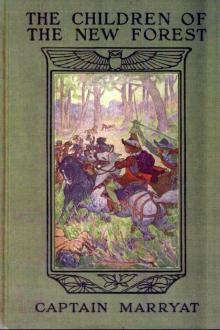 The Children of the New Forest
The Children of the New Forest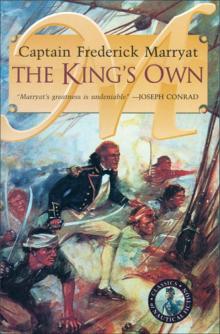 The King's Own
The King's Own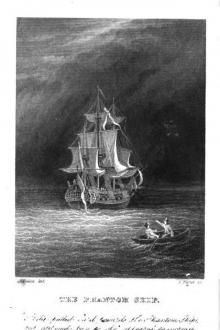 The Phantom Ship
The Phantom Ship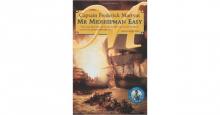 Mr. Midshipman Easy
Mr. Midshipman Easy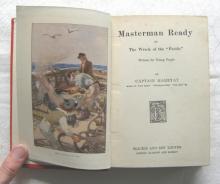 Masterman Ready; Or, The Wreck of the Pacific
Masterman Ready; Or, The Wreck of the Pacific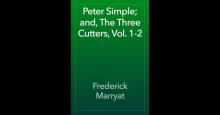 Peter Simple; and, The Three Cutters, Vol. 1-2
Peter Simple; and, The Three Cutters, Vol. 1-2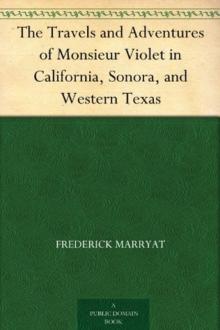 Travels and Adventures of Monsieur Violet
Travels and Adventures of Monsieur Violet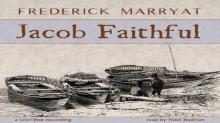 Jacob Faithful
Jacob Faithful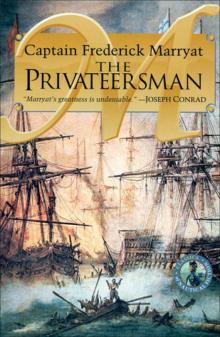 The Privateersman
The Privateersman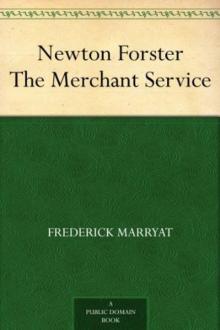 Newton Forster
Newton Forster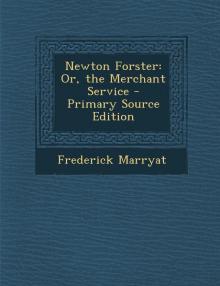 Newton Forster; Or, The Merchant Service
Newton Forster; Or, The Merchant Service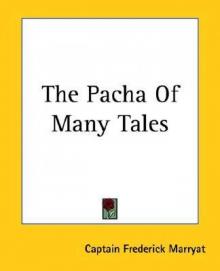 The Pacha of Many Tales
The Pacha of Many Tales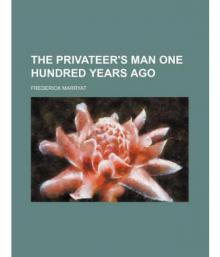 The Privateer's-Man, One hundred Years Ago
The Privateer's-Man, One hundred Years Ago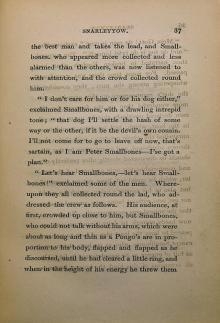 Snarleyyow, or, the Dog Fiend
Snarleyyow, or, the Dog Fiend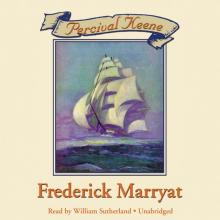 Percival Keene
Percival Keene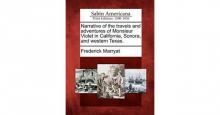 The Travels and Adventures of Monsieur Violet in California, Sonora, and Western Texas
The Travels and Adventures of Monsieur Violet in California, Sonora, and Western Texas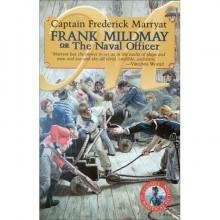 Frank Mildmay; Or, the Naval Officer
Frank Mildmay; Or, the Naval Officer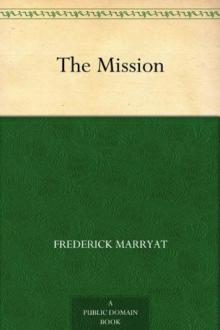 The Mission
The Mission